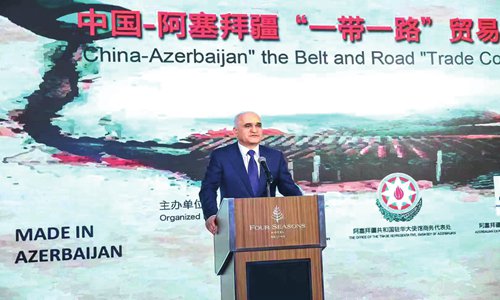Azerbaijan will active participant in BRI

Azerbaijan's Minister of Economy Shahin Mustafayev gives a speech. (Courtesy of the Office of Trade Representative at the Embassy of Azerbaijan in Beijing)
It's often hard for countries rich in resources to get rid of the so-called "Dutch disease," mainly because those countries only need to export their resources in exchange for money while other countries have to earn money through such laborious methods like manufacturing, research and development.
But unfortunately, such a comfortable mode of overly relying on resources is often not sustainable.
Azerbaijan is well-known for its rich petroleum resources. But in recent years, the government of Azerbaijan has continuously deepened economic reforms, worked to speed up economic development in non-oil and non-gas areas as well as improved the country's investment environment.
On March 1, the China and Azerbaijan Belt and Road Trade Cooperation Roundtable was held in Beijing. Azerbaijan's Minister of Economy Shahin Mustafayev (Mustafayev) stressed that the country is determined to conduct economic transition when he was interviewed by the Global Times (GT) during the event.
GT: Please introduce the highlights of the China and Azerbaijan economic and trade cooperation in recent years.
Mustafayev: Last year, the trade volume between China and Azerbaijan reached $1.3 billion, doubling the amount in 2013. The reason why I mention 2013 is because that's the year when Chinese President Xi Jinping proposed the Belt and Road Initiative (BRI).
In 2015, the president of Azerbaijan paid a state visit to China. The two countries signed a memorandum of understanding to jointly push forward the Silk Road Economic Belt and also show that Azerbaijan expresses its support for the BRI. Azerbaijan has carried out cooperation with China in various areas and has been one of the most active participants in the China-proposed BRI.
We intend to further increase the trade volume between Azerbaijan and China, and we have been making efforts and organizing activities to reach that goal.
Recently, Azerbaijan has established trade representative offices in several countries, and one of the first is in China. We also opened two wine centers and one trading house in China last year.
We have reached an agreement with China's Minister of Commerce Zhong Shan during a recent meeting to initiate negotiations on a preferential trade agreement. These aforementioned measures will largely boost the trade volume between Azerbaijan and China.
GT: What do you expect from China and Azerbaijan's economic and trade cooperation at a time when China is about to hold the two sessions?
Mustafayev: I want to stress that currently China and Azerbaijan's relations have reached a very high level. Both China and Azerbaijan intend to push cooperation in areas including oil and gas, international transportation, investment, tourism, communications and information technology.
In recent years, Azerbaijan has made an indirect investment of $1.6 billion in China. This is a very large number for Azerbaijan, which shows that Azerbaijan trusts Chinese leaders, the Chinese government as well as the Chinese people. Currently, Chinese leaders have already seen Azerbaijan's potential in the Trans-Caspian East-West Trade and Transit Corridor, and have expressed support for this project. As for financial cooperation, the Asian Infrastructure Investment Bank also provided a loan to Azerbaijan's Trans-Anatolian Natural Gas Pipeline project. These, in addition to the accomplishments I have mentioned above, show that the two countries will have a bright future in their cooperation.
GT: Azerbaijan has set a target that it should have 80 percent of its GDP coming from non-oil sectors. How has this target been assessed so far?
Mustafayev: This is a very important strategy for us. This is our goal. We want to achieve this goal so that our economy won't rely on oil and gas, and that our economy will be more diversified.
Over the recent three years, our development in this direction has been declining a little bit, as we were influenced by external factors such as protectionism and unilateralism, but we are determined to hold on.
GT: Azerbaijan is located on the border of Europe and Asia, which is a very important geographical position. What influence does this position have on Azerbaijan's development?
Mustafayev: Azerbaijan is located at the crossroads of Europe and Asia. It also stretches over multiple routes, making it a traffic hub as well as a transiting point.
Last year, our international maritime trade port officially went into operation. Recently, we also completed a new railway project which would make the Trans-Caspian International Transit Corridor one of the shortest and safest routes connecting China and Europe.

